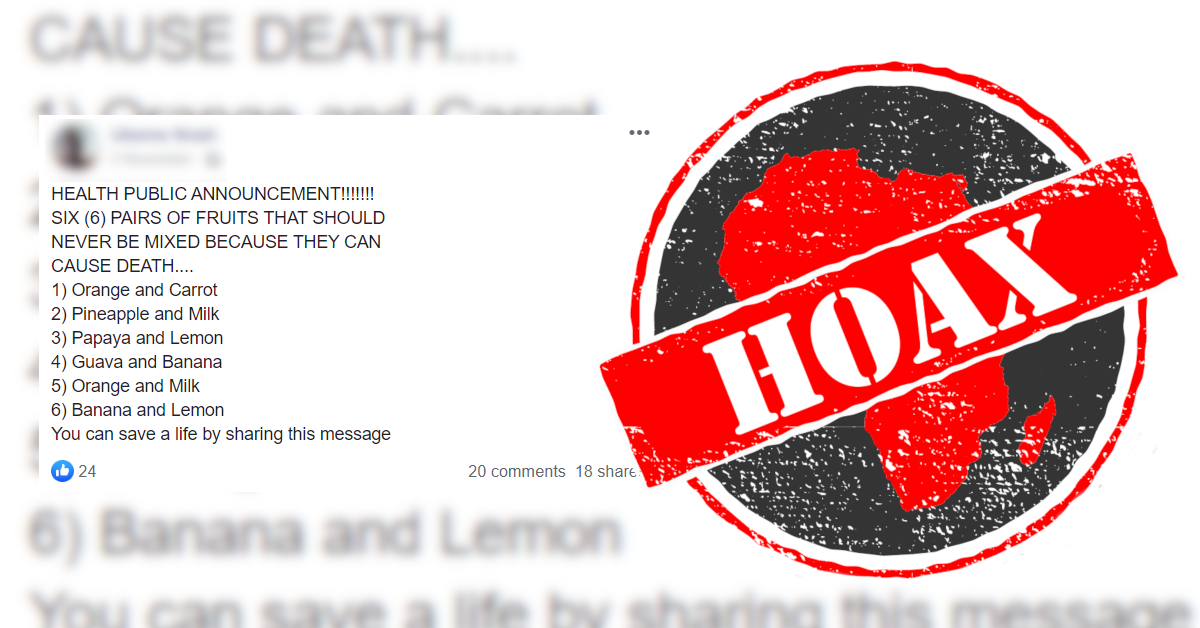“Eat any of these paired fruits and you could die,” warns a Facebook post shared in Nigeria in November 2019.
It lists “six pairs of fruits that should never be mixed because they cause death”. These are the combinations of orange and carrot, pineapple and milk, papaya and lemon, guava and banana, orange and milk, and banana and lemon.
“You can save a life by sharing this message,” the post says.
Eating fruits and vegetables every day can help prevent heart disease, according to the World Health Organization. Fruits and vegetables are also associated with reduced risk of obesity and diabetes.
Fruits and vegetables provide an abundant, cheap source of fibre and many vitamins and minerals, according to the United Nations Food and Agriculture Organization.
But is there an unknown danger in combining some of these healthy foods? We checked.

“The claim is false,” said Simeon Chituru Achinewhu, professor of food and nutritional biochemistry at the Rivers State University of Science and Technology in southern Nigeria.
“There is no scientific proof that combining any of these fruits could lead to death.”
Achinewhu added that these foods are rich in vitamins and minerals.
“Combining them together is not harmful to the body,” he told Africa Check. “They are not poisonous and cannot cause death.” – Jennifer Ojugbeli
It lists “six pairs of fruits that should never be mixed because they cause death”. These are the combinations of orange and carrot, pineapple and milk, papaya and lemon, guava and banana, orange and milk, and banana and lemon.
“You can save a life by sharing this message,” the post says.
Eating fruits and vegetables every day can help prevent heart disease, according to the World Health Organization. Fruits and vegetables are also associated with reduced risk of obesity and diabetes.
Fruits and vegetables provide an abundant, cheap source of fibre and many vitamins and minerals, according to the United Nations Food and Agriculture Organization.
But is there an unknown danger in combining some of these healthy foods? We checked.

False claim, with no scientific proof
“The claim is false,” said Simeon Chituru Achinewhu, professor of food and nutritional biochemistry at the Rivers State University of Science and Technology in southern Nigeria.
“There is no scientific proof that combining any of these fruits could lead to death.”
Achinewhu added that these foods are rich in vitamins and minerals.
“Combining them together is not harmful to the body,” he told Africa Check. “They are not poisonous and cannot cause death.” – Jennifer Ojugbeli
Republish our content for free
For publishers: what to do if your post is rated false
A fact-checker has rated your Facebook or Instagram post as “false”, “altered”, “partly false” or “missing context”. This could have serious consequences. What do you do?
Click on our guide for the steps you should follow.
Publishers guideAfrica Check teams up with Facebook
Africa Check is a partner in Meta's third-party fact-checking programme to help stop the spread of false information on social media.
The content we rate as “false” will be downgraded on Facebook and Instagram. This means fewer people will see it.
You can also help identify false information on Facebook. This guide explains how.





Add new comment